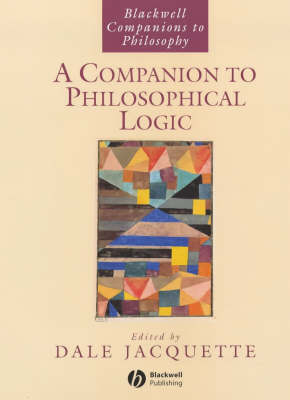
A Companion to Philosophical Logic
Blackwell Publishers (Verlag)
978-0-631-21671-1 (ISBN)
- Titel ist leider vergriffen;
keine Neuauflage - Artikel merken
This collection of newly commissioned essays by international contributors offers a representative overview of the most important developments in contemporary philosophical logic. Written by experts from a variety of different logical and philosophical perspectives, the volume presents controversies in philosophical implications and applications of formal symbolic logic. Each section features contributors currently active in research who explain the central ideas of their special field and take a philosophical stand on recent issues in the intersection of logic and analytic philosophy. Taken together, the essays survey major trends and offer original insights to advance research and philosophical discussion. A Companion to Philosophical Logic provides a comprehensive state-of-the-art handbook for students and professional researchers in philosophical logic.
Dale Jacquette is Professor of Philosophy at The Pennsylvania State University. He is the author of Philosophy of Mind(1994), Meinongian Logic: The Semantics of Existence and Nonexistence (1996), Wittgenstein's Thought in Transition (1998), Symbolic Logic (2001) and On Boole: Logic as Algebra (2001) as well as numerous articles on logic, metaphysics, philosophy of mind, and Wittgenstein.
Preface.Acknowledgments.List of Contributors.Introduction: Logic, Philosophy, and Philosophical Logic: Dale Jacquette (Pennsylvania State University).Part I: Historical Development of Logic:1. Ancient Greek Philosophical Logic: Robin Smith (Texas A M University).2. History of Logic: Medieval: B.G. Sundholm (Leiden University) and E.P. Bos (Leiden University).3. The Rise of Modern Logic: Rolf George (University of Waterloo) and James Van Evra (University of Waterloo).Part II: Symbolic Logic and Ordinary Language:4. Language, Logic, and Form: Kent Bach (San Francisco State University).5. Puzzles About Intensionality: Nathan Salmon (University of California, Santa Barbara).6. Symbolic Logic and Natural Language: Emma Borg (University of Reading) and Ernest Lepore (Rutgers University).Part III: Philosophical Dimensions of Logical Paradoxes:7. Logical Paradoxes: James Cargile (University of Virginia).8. Semantical and Logical Paradox: Keith Simmons (University of North Carolina at Chapel Hill).9. Philosophical Implications of Logical Paradoxes: Roy A. Sorensen (Dartmouth College).Part IV: Truth and Definite Description in Semantic Analysis:10. Truth, the Liar, and Tarski's Semantics: Gila Sher (University of California, San Diego).11. Truth, the Liar, and Tarskian Truth Definition: Greg Ray (University of Florida).12. Descriptions and Logical Form: Gary Ostertag (New York University).13. Russell's Theory of Definite Descriptions as a Paradigm for Philosophy: Gregory Landini (University of Iowa).Part V: Concepts of Logical Consequence:14. Necessity, Meaning, and Rationality: The Notion of Logical Consequence: Stewart Shapiro (Ohio State University).15. Varieties of Consequence : B.G. Sundholm (Leiden University).16. Modality of Deductively Valid Inference : Dale Jacquette (Pennsylvania State University).Part VI Logic, Existence, and Ontology:17. Quantifiers, Being and Canonical Notation: Paul Gochet (University of Liege).18. From Logic to Ontology: Some Problems of Predication, Negation and Possibility: Herbert Hochberg (University of Texas).19. Putting Language First: The "Liberation" of Logic from Ontology: Ermanno Bencivenga (University of California, Irvine).Part VII: Metatheory and the Scope and Limits of Logic:20. Metatheory: Alasdair Urquhart (University of Toronto).21. Metatheory of Logics and the Characterization Problem: Jan Wolenski (Jagiellonian University).22. Logic in Finite Structures: Definability, Complexity, and Randomness: Scott Weinstein (University of Pennsylvania).Part VIII: Logical Foundations of Set Theory and Mathematics:23. Logic and Ontology: Numbers and Sets: Jose Benardete (Syracuse University).24. Logical Foundations of Set Theory and Mathematics: Mary Tiles (University of Hawaii) .25. Property-Theoretic Foundations of Mathematics: Michael Jubien (University of California, Davis).Part IX: Modal Logics and Semantics:26. Modal Logic: Johan van Benthem (University of Amsterdam).27. First Order Alethic Modal Logic: Melvin Fitting (City University of New York).28. Proofs and Expressiveness in Alethic Modal Logic: Maarten de Rijke (University of Amsterdam) and Heinrich Wansing (Dresden University of Technology).29. Alethic Modal Logics and Semantics: Gerhard Schurz (University of Dusseldorf).30. Epistemic Logic: Nicholas Rescher (University of Pittsburgh).31. Deontic, Epistemic, and Temporal Modal Logics: Risto Hilpinen (University of Miami).Part X: Intuitionistic, Free, and Many-Valued Logics:32. Intuitionism: Dirk van Dalen (University of Utrecht) and Mark van Atten (University of Utrecht).33. Many-Valued, Free, and Intuitionistic Logics: Richard Grandy (Rice University).34. Many-Valued Logic: Grzegorz Malinowski (University of Lodz).Part XI: Inductive, Fuzzy, and Quantum Probability Logics:35. Inductive Logic : Stephen Glaister (University of Washington).36. Heterodox Probability Theory: Peter Forrest (University of New England).37. Why Fuzzy Logic?: Petr Hajek (Academy of Sciences of the Czech Republic).Part XII: Relevance and Paraconsistent Logics:38. Relevance Logic: Edwin Mares (Victoria University of Wellington).39. Paraconsistency: Bryson Brown (University of Lethbridge).40. Logicians Setting Together Contradictories: A Perspective on Relevance, Paraconsistency, and Dialetheism: Graham Priest (University of Melbourne).Part XIII: Logic, Machine Theory, and Cognitive Science:41. The Logical and the Physical: Andrew W. Hodges (Wadham College, Oxford University).42. Modern Logic and its Role in the Study of Knowledge: Peter A. Flach (University of Bristol).43. Actions and Normative Positions: A Modal-Logical Approach : Robert Demolombe (Toulouse Center) and Andrew J.I. Jones (University of Oslo).Part XIV: Mechanization of Logical Inference and Proof Discovery:44. The Automation of Sound Reasoning and Successful Proof Finding: Larry Wos (Argonne National Laboratory) and Branden Fitelson (San Jose State University).45. A Computational Logic for Applicative Common LISP: J. Strother Moore (University of Texas) and Matt Kaufmann (Advanced Micro Devices, Inc).46. Sampling Labelled Deductive Systems: D.M. Gabbay (King's College).Resources for Further Study.Index.
| Erscheint lt. Verlag | 18.1.2002 |
|---|---|
| Reihe/Serie | Blackwell Companions to Philosophy |
| Verlagsort | Oxford |
| Sprache | englisch |
| Maße | 171 x 246 mm |
| Gewicht | 1570 g |
| Themenwelt | Geisteswissenschaften ► Philosophie ► Logik |
| ISBN-10 | 0-631-21671-5 / 0631216715 |
| ISBN-13 | 978-0-631-21671-1 / 9780631216711 |
| Zustand | Neuware |
| Informationen gemäß Produktsicherheitsverordnung (GPSR) | |
| Haben Sie eine Frage zum Produkt? |
aus dem Bereich


